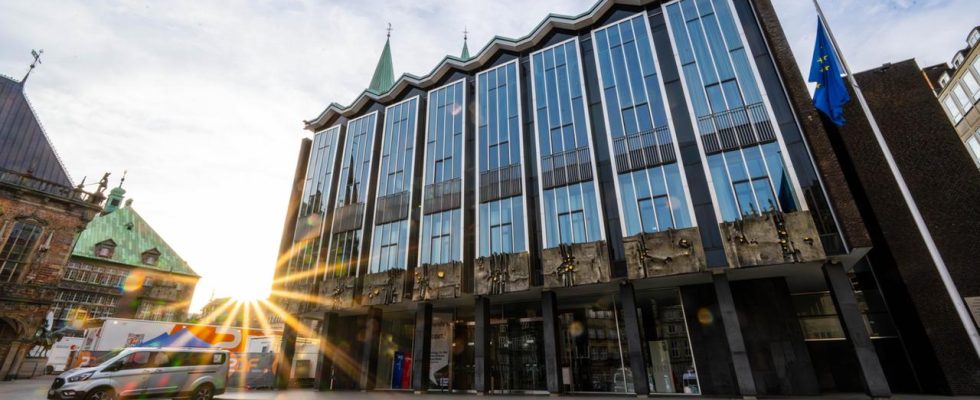analysis
The election in Bremen is exciting in many ways. The balance of the alliance of SPD, Greens and Left is modest after four years. The CDU is finding it difficult to build on previous successes. And the AfD does not compete.
This is an exciting election, and not only from a Bremen perspective: for the first time in the western German states, the left is taking part in a state government and is now being evaluated by the voters. And: For the first time in almost ten years, a state election will be held without the participation of the AfD, because they could not draw up a valid list of candidates.
Mayor Andreas Bovenschulte of the SPD took office in 2019 after the party achieved its worst result in the history of Bremen and was overtaken by the CDU for the first time. He formed the Senate with the Greens and the Left. After four years, the balance sheet is rather modest. Bremen is the federal state with the highest unemployment rate, and the voters also rated the economic situation as worse than in all other states before the most recent elections there.
Greens are under double pressure
According to the pre-election survey by Infratest dimap from the past week, 54 percent of those questioned are dissatisfied with the work of the Senate, and only 41 percent rate it positively. This is also an unusually low value in a comparison of the federal states before elections, only undercut by the Berlin Senate, which was voted out in February. The citizens are dissatisfied with the work of the authorities, the schools and the security situation in the cities of Bremen and Bremerhaven, which together form the federal state. Security and order are the key issues for older people, education is for the younger ones.
It is unusual how differently the three government partners are evaluated. The anger is concentrated on the Greens, especially on construction and transport senator Maike Schaefer, who, like her Berlin colleague, polarized with the restriction of car traffic. The Greens are therefore under double pressure in this election. After the heating dispute and the affair about Secretary of State for Energy and Climate Patrick Graichen, the poll values are falling nationwide. In Bremen, actually a stronghold of the Greens, the values before the election were even below the national average: only 21 percent of those surveyed were satisfied with the work of the Greens in the Bremen Senate.
Good grades for SPD Senate work
The Senate work of the SPD, which – like from 1946 to 2015 – would like to become the strongest party again, was rated the best with 47 percent. She owes the fact that she was slightly ahead of the CDU in the polls to Bovenschulte, who is also widely accepted by supporters of the opposition parties. The party’s expertise is rated only slightly better than it was four years ago. And SPD Chancellor Olaf Scholz is only moderately popular. For the party, it will depend entirely on how Bovenschulte mobilizes.
The first participation in government by the left in the West is rated as surprisingly positive. After all, 38 percent of those surveyed give good grades, and Economics Senator Kristina Vogt is rated positively by around half. According to their own statements, 46 percent would like it if the left continued to participate in the government.
AfD is not there
The Bremen CDU is struggling to build on its success four years ago. The top candidate and president of the parliament, Frank Imhoff, is nowhere near as popular as Carsten Meyer-Heder, a career changer from business, four years ago. And in important areas such as the economy, transport and the fight against crime, the party is less trusted than it was then.
It not only competes with the SPD and FDP for votes, but also with the voters’ association “Bürger in Wut” (BiW). It emerged in 2004 from the former Schill party, focuses on order and security and is considered right-wing conservative, but not right-wing extremist. So far, BiW has only been represented in the citizenship by a mandate from Bremerhaven. After the AfD failed to submit legally valid lists and was therefore unable to take part in the election, the “citizens in anger” now have good prospects of clearing the five percent hurdle nationwide. Even if the association tries to clearly differentiate itself from the AfD, it is perceived by many voters as an alternative to the AfD. A large proportion of the votes are likely to come from this camp.
The FDP relies on exploiting its potential with clear opposing positions in finance and transport policy. And hopes to be able to turn the negative trend of the last state elections.
Waiting for the final election result
As always in Bremen, the parties and the public will have to wait longer than usual for projections and the result. The Bremen electoral law gives the possibility to distribute five votes to parties and persons as desired. Instead of a ballot paper, there is a bound ballot booklet.
The count will not take place in the voting districts, but centrally in Bremen and Bremerhaven and will last well into the coming week. Infratest dimap does not expect a first extrapolation before 8 p.m., probably even later.

